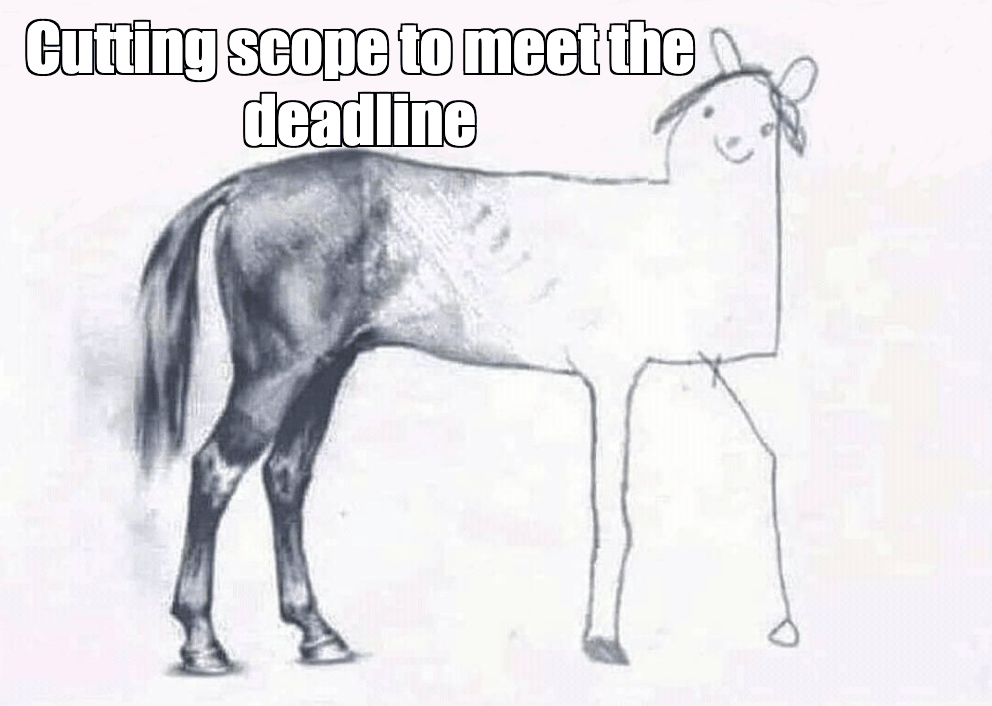- Out of Scope
- Posts
- 🚀 Why I missed my newsletter deadline this week
🚀 Why I missed my newsletter deadline this week
The 3-option framework for setting deadlines that don't kill you (or your team)
Some of you observant readers might have noticed this newsletter came out on Friday instead of Wednesday. I started writing too close to my deadline and wasn't happy with what I'd produced. I try to think of Wednesday as a soft deadline, so I’m willing to move it if it means that I can improve the quality of the product that I put out.
Every time we set a "deadline," we're unconsciously invoking a Civil War prison where crossing the line meant death. According to NPR, the term emerged at the Confederate Andersonville military prison, where it was designated "a line, either actually drawn or simply understood, beyond which if prisoners stepped, they would be shot to death."
Maybe that explains why deadlines feel so brutal.
This felt just a bit similar to when I missed a major product launch deadline at ZipRecruiter—and it nearly killed my credibility with stakeholders. I was launching a series of paid products that would make job postings more noticeable to candidates. Sales needed lead time to train reps, product marketing needed to produce materials, and everything was coordinated around one agreed-upon date.
As launch day approached, my engineer wasn't sure he'd finish on time, but we pushed ahead anyway. Then he found a critical bug right before going out on vacation, but failed to notify me. (He might have benefited from reading my article on writing OOO handoff docs 😂.) The morning of launch, our sales team was ready to sell, marketing had sent announcements, and we...weren’t ready. I scrambled to find another engineer, debug the code, and we ended up delaying by two days.
I learned two crucial lessons: when setting a hard deadline with stakeholders, it's better to give a buffer of time and only set a date when you're confident in completion. But the bigger realization came later: The art of deadline management isn't just about hitting every date—it's about knowing when to set hard deadlines, soft deadlines, or no deadlines at all.
Hard deadlines are non-negotiable. Miss them and you face real consequences—lost revenue, broken commitments, regulatory violations. These require buffer time, careful risk management, and absolute certainty before you commit.
Soft deadlines are targets that help focus effort and create momentum. They can move if needed without catastrophic consequences. These are about learning, iterating, and maintaining progress.
When to Use Hard Deadlines
External dependencies with real consequences. If your product launch is tied to a marketing campaign, a seasonal event like Black Friday, or regulatory requirements, the deadline is genuinely hard. Missing it might hurt your business.
High coordination scenarios. When multiple teams, like sales, marketing, and customer support, need extended lead time to prepare, you need a hard deadline. Some stakeholders need weeks to create training materials or update processes.
Critical business milestones. Fundraising deadlines, customer commitments, or board-mandated launches create real urgency. The business impact of delay is severe and immediate.
Stop-loss checkpoints. In experimental projects, hard deadlines force crucial go/no-go decisions. Set a date to validate your hypothesis or hit specific metrics before investing further.
The key with hard deadlines: build in at least a few extra days of buffer room before announcing the date, and only commit if you're genuinely confident in completion.
When to Use Soft Deadlines
Maintaining velocity and accountability. Soft deadlines create urgency and keep teams focused on shipping, while allowing flexibility if you discover you need more time. The goal is progress, not perfection by a specific date.
High uncertainty environments. Pre-product-market-fit features might need flexibility to adapt as you learn. Agile environments thrive with soft deadlines that evolve with scope.
Internal-only projects. No external dependencies means no real consequences for missing the date. Soft deadlines provide direction without stress.
When NOT to Use Deadlines
Sometimes the best deadline is no deadline at all. Purely creative or research-heavy work often suffers under arbitrary time pressure, and projects where teams are learning entirely new technology benefit from open-ended exploration rather than false urgency that can lead to bad decision-making.
At Hims, I experienced the flip side of this lesson while launching our weight loss category. We had many stakeholders coordinated around a launch date, and as it approached, we hit an infrastructure snag that forced the team to work overtime for weeks to make the deadline.
We were then shocked to hear that the night before the launch, executives pushed back the date for investor communication reasons. The team was deflated. They'd worked incredibly hard to meet what they thought was an impossible deadline, only to have it pushed back for reasons unrelated to their efforts.
The lesson: Once you set a hard deadline and people sacrifice to meet it, shifting it for non-critical reasons undermines the entire concept of hard deadlines. Your team will question whether future "hard" deadlines are really hard.
Finally, remember that missing a deadline shouldn't be a blame game. Treat it as a learning opportunity through post-mortems to improve future planning. The goal isn't to just hit your deadlines—it's to be intentional about which ones you set, communicate their nature clearly, and build systems that help you deliver on the promises that matter.
Because, unlike that Civil War prison line, crossing a well-set deadline shouldn't be a death sentence for anyone. Unless, of course, your feature is a flop; then maybe it’s warranted.
Reply to the email and let me know if you’ve ever missed a deadline or had to move one!
What has to be broken before you can use it?
The Meme

There’s a reason this newsletter is called Out of Scope